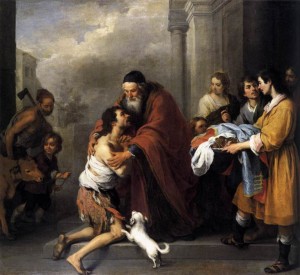Thoughts on Sunday’s Lessons for March 30, 2025 (Lent 4C)

The Prodigal Son (1622), oil painting on panel by Gerard van Honthorst (1592-1656). Alte Pinakothek, Munich. (Click image to enlarge.)
First Reading: Joshua 5:9-12
Fresh starts and new beginnings: These themes resonate in Sunday’s readings as we reach the midpoint of Lent. From the Israelites’ arrival at the Promised Land in the first reading to the Prodigal Son’s joyful return home in the Gospel, we remember that God stays with us through transition and change. In the first reading from Joshua, we see a people filled with joy. They have reached Canaan, the land of milk and honey. No longer reliant on manna for sustenance, they celebrate the end of 40 years in the desert with fresh bread made from the produce of the promised land.
Psalm: Psalm 32
Who hasn’t known the anguish of doing something wrong that hurt a loved one? An angry word flares. A careless act happens. And then we see that look of pain, a sob, and a burst of tears, and we feel anguish and guilt. At that point, there is just one thing to say: “I’m sorry.” When this simple response brings a smile and forgiveness, everything feels better. This is the reward of repentance: When we sin and step away from God, it hurts. But then, as we chant in this Psalm, God’s forgiveness and steadfast love can make us shout for joy.
Second Reading: 2 Corinthians 5:16-21
There is tension in Paul’s second letter to the people of Corinth. The people of this Greek Christian community have been arguing with Paul and with each other. Paul, loving them in spite of it all, entreats them to be reconciled to God on behalf of Christ. Our new direction as Christians, Paul tells them, comes when we recognize Jesus not only as human but as Christ, the Son of God, the Messiah. In Christ, everything old has passed away. Everything has become new! Through Christ, God forgives all our trespasses and reconciles the world to God.
Gospel: Luke 15:1-3, 11b-32
The story of the Prodigal Son is surely one of the most beloved parables, and it’s easy to grasp its meaning: God forgives us when we stray and then return. Even if we have been prodigally sinful, God welcomes us home with a father’s joy and abundant celebration. But there’s more to this textured story: Consider the older brother: Hurt because his good and faithful behavior earned him no reward, he is consoled by his father’s loyal, long-standing love. It’s also easy to forget the setting for this familiar story: Jesus told it in response to a crowd of scribes and Pharisees who were upset because Jesus welcomed tax collectors and sinners at his table.




